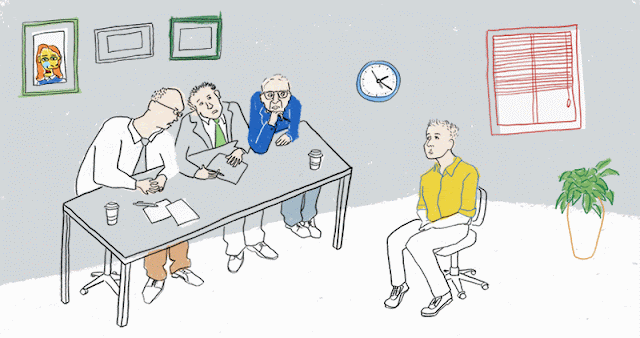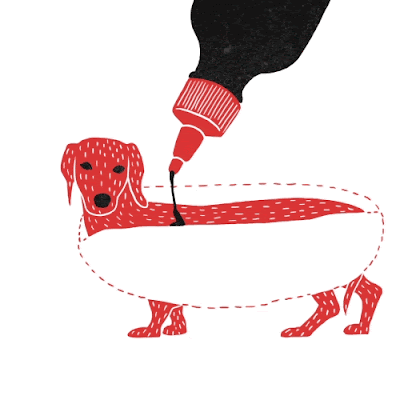工作面試與賭徒謬誤有啥關係,讓NPR告訴你!這樣學英文能讓你更聰明!
這篇NPR的廣播,討論的是關於工作面試的有趣現象。托福英聽的補充教材,一周是科學人Scientific American,一周是NPR( National Public Radio),有聽有保庇,且邊聽英文還能增長見聞,讓你越來越聰明!記得每篇多聽個幾次,聽到能朗朗上口你就出運啦!
Deciphering Hidden
Biases during Interviews
STEVE INSKEEP, HOST:
Benjamin Franklin said the only certain
things are death and taxes. Let's add a third thing: Interviews. At many
points, starting with school admissions or a new job, you're going to sit down
before someone else and answer their questions.
Which is what NPR's Shankar Vedantam is
about to do with us because he's got some new research relating to this topic.
Hi, Shankar.
SHANKAR VEDANTAM, BYLINE: Hi, Steve.
INSKEEP: And let's begin this interview.
What's the new research about?
VEDANTAM: Well, we often have intuitive beliefs直覺的相信
about what's going to help us during the course of an interview. So people say
it’s best not to interview right before lunch, because interviewers
are going to be hungry and they'll treat you badly. Or it's best not to
interview at the end of the day, because interview panelists小組成員
are going to be tired. We also believe it matters who comes right before
us in the interview schedule.
So if you were applying for a job, Steve,
would you prefer to follow a really strong candidate? Or would you
prefer to come after a really weak candidate?
INSKEEP: You're asking me.
VEDANTAM: I am asking you.
INSKEEP: You know, I don't think I've ever
thought about that in my life. I'm sorry to disappoint you.不好意思讓你失望了 I just try to go in and make an impression讓人印象深刻.
But in any event不管怎麼說, you're laying out kind of folk wisdom一般民眾的經驗談
here. People pass this on and try to game the system戰勝制度
if they can.
VEDANTAM: Yeah. So I mean, I've often
thought that it's better to come after a really weak candidate because that can
make me look
better by contrast. And God knows I need that.
VEDANTAM: Now it turns out that my
intuition was wrong. I spoke with Uri Simonsohn. He's a management professor at
the Wharton
School美國賓州大學的華頓商學院,
and along with Francesca Gino at the Harvard Business School哈佛商學院, they've tracked who is successful during
MBA interviews - massive studies involving 9,000 conducted over 10
years.
INSKEEP: These are people who were
interviewing for college Masters Business degree programs.
VEDANTAM: That's exactly right. And what
Simonsohn and Gino find is that going after a really strong candidate doesn't
hurt you. What does matter is going last in the day. But there's a catch有個但書.
It can either really hurt you, or it can really help you. Here's Simonsohn.
URI SIMONSOHN: If it was a good day
with many good candidates, it's really a bad idea to the last. But if it was a weak day with many bad
candidates, it's a really good idea to go last.如果一整天來面試的人都不太優秀,那麼最後一個進去其實反而好。
VEDANTAM: So it turns out結果是, what matters is not your contrast with the
immediate preceding前一個
candidate, but your contrast with the last
several preceding candidates前幾個. And it stems from起源於
a
bias偏見 that
actually has a name. It's called the gambler's fallacy賭徒謬誤,又稱為蒙地卡羅謬誤.
Let me explain it to you.
INSKEEP: OK.
VEDANTAM: Let's say I have a coin
and I toss it up in the air and it comes on heads.
INSKEEP: All right.
VEDANTAM: I toss it again, it comes on
heads again.
INSKEEP: Mm-hmm.
VEDANTAM: I toss it third time, it comes on
heads again. Now assuming it's a fair coin這枚硬幣沒被動手腳 and I'm
not cheating, when I toss it up a fourth time, what do you expect is going to
happen?
INSKEEP: You would expect, gosh, it's got
to come up tails
one of these times.
VEDANTAM: Exactly. That's what I would
expect too. And this is called a gambler's fallacy, because the truth is the
coin has no memory.
So heads is actually just as likely the fourth time it's tails, but we have a
very strong intuition that the streak has to be broken.連續出現同一個狀況的情形應該要被打破。如頭硬幣三次都是正面,心中就會期待第四次應該要出現反面。
INSKEEP: OK.
VEDANTAM: Simonsohn thinks this is exactly what's happens with interview
panels, that if you're interviewing candidates and the first candidate
is really weak and the second is really weak and the third is really weak, you
believe, generally, that there should be an equal number of strong and weak
candidates. And what they find is that interviewers add the equivalent of two
years of job
experience to the last candidate in a row連續的,
who is weak, in order to break the streak.
INSKEEP: You'll start grading on the curb原來的意思是「在路邊」,這裡延伸的意思是指面試官故意不給面試者高分 in order
to find a strong candidate.
VEDANTAM: That's exactly what happens. They
think this is happening not just with interviews, but it's probably happening
with
judges and criminal defendants. It's probably happening with loan officers貸款專員
and
applicants. Simonsohn thinks it's even happening with movie critics.
SIMONSOHN: If you're a movie critic, and
you watch 10 movies, you will almost never find all of them good, even though
sometimes that should happen. Just by
chance意外的, you
watch 10
very good movies in a week and you should rate all of them to be outstanding,
because you don't think all movies are good and then you make the wrong leap of
thinking well, any set of 10, it can't be that all 10 of them are good.
INSKEEP: OK. So if I'm an interview
candidate for a job or a slot in the school, my goal should be to be
surrounded by mediocrity平庸的人,
I get that.
INSKEEP: But, if you're interviewing
people...
VEDANTAM: Right.
INSKEEP: ...and you want to avoid this
bias, this mistake, what do you do?
VEDANTAM: What Simonsohn thinks interview
panels should do is : have a spreadsheet
表格where they can see all the
candidates they've interviewed, not just on that one day, but over several
days. And when you step
back退一步 and
actually say yeah, there are an equal number of strong and weak candidates,
even though you may have the streaks of連續
four or five really strong or really weak candidates in a row.
INSKEEP: What you said, basically, has a lesson
that's broadly applicable to life, I would think: don't get too focused
on the last few things that happened and assume there's a pattern
there. Look much more broadly.
VEDANTAM: Exactly. And don't assume that
the small pattern necessarily has to reflect the large pattern.
So if you toss the coin a million times in a row, and it comes down
a million times heads, something is seriously wrong. But if you toss it and it
comes down five times in a row heads, it's actually not such a big deal.沒什麼大不了
INSKEEP: Shankar, thanks.
VEDANTAM: Thanks, Steve.











老師這句是什麼意思壓?
回覆刪除演講者講完之後對方怎麼在笑
And what they find is that interviewers add the equivalent of two years of job experience to the last candidate in a row連續的, who is weak, in order to break the streak.
Hi LILIN Frau
回覆刪除這一段是在講面試官的迷思,因為大多數的面試官都不願意相信來應徵的人一概都很爛,所以在連續經歷了幾個很爛面試者之後,最後一個出現的面試者,即便真的也很爛,面試官也會主觀地替這個人加分(也就是替他加上兩年的工作經驗以凸顯對方的能力),這麼做只是為了break the streak打破這個一路爛的記錄啊。因為最後一個面試者說不定更爛,但是這個人會因為主考官的迷思而獲利。
說完之後主持人跟來賓主講人就笑開了
老師
回覆刪除您好
可以請你用"on the curb" 這個片語造一些句子嗎?
謝謝!
Hi Judy,
回覆刪除On the curb - being broke or being always out of money.
Example :He's been on the curb ever since he lost his job at the firm.